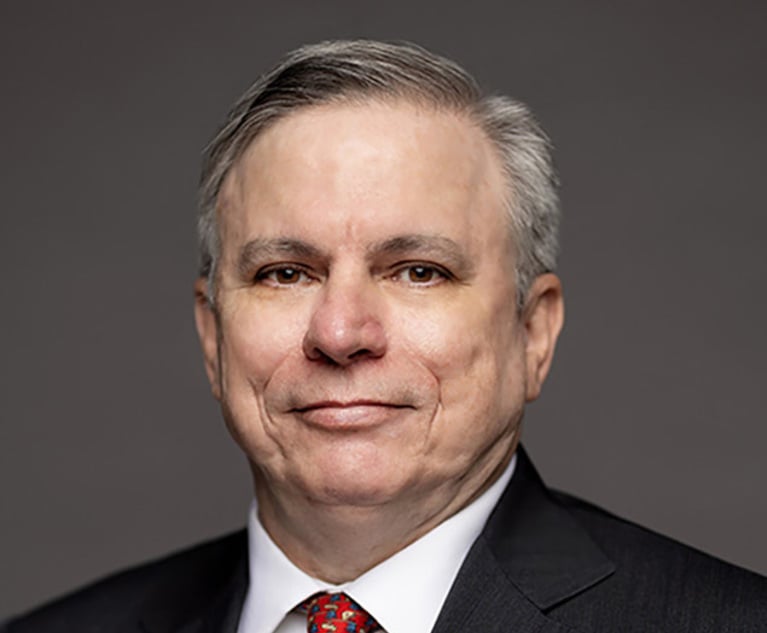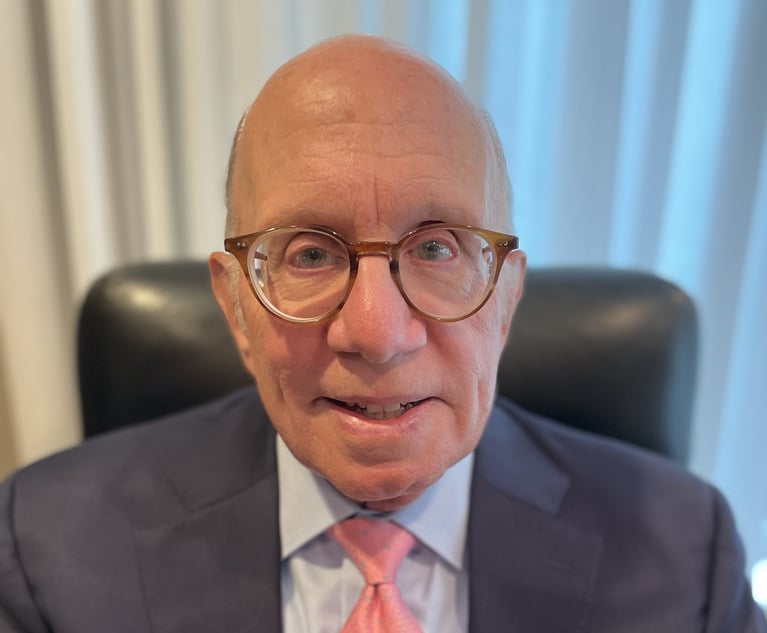 Acting Attorney General Matthew Whitaker and Special Counsel Robert Mueller III (Photos by Diego Radzinschi)
Acting Attorney General Matthew Whitaker and Special Counsel Robert Mueller III (Photos by Diego Radzinschi)If Mueller Is Fired, What Then?
If Mueller is fired, what, if anything, can be done to investigate whether the President colluded with the Russians in connection with his 2016 election bid and, assuming arguendo he committed crimes in connection with any such collusion, to insure that he is ousted from office and appropriately sanctioned? A review of the available options shows that there are few and that none of them is really good
November 30, 2018 at 02:25 PM
7 minute read
Will President Trump fire Special Counsel Robert Mueller? It seems probable given his firing of Attorney General Jeff Sessions and his appointment of Matthew Whitaker as Acting Attorney General immediately following the November election. Sessions was protective of Deputy Attorney General Rod Rosenstein, the Department of Justice official to whom Mueller reports, and Whitaker, a Trump sycophant, has previously publicly disparaged the Mueller Investigation. If Mueller is fired, what, if anything, can be done to investigate whether the President colluded with the Russians in connection with his 2016 election bid and, assuming arguendo he committed crimes in connection with any such collusion, to insure that he is ousted from office and appropriately sanctioned? A review of the available options shows that there are few and that none of them is really good.
State and Local Investigations/Prosecutions. For some time now there has been a lot of loose, uninformed talk by political pundits about State Attorneys General or other local prosecutors picking up where Mueller leaves off. But there are significant obstacles to investigations/prosecutions of the President in the two most likely local jurisdictions: New York state (where Trump maintained his 2016 campaign headquarters) and the District of Columbia (home of the Federal Election Commission and the locus of much of the obstruction of justice/false statements under investigation by Mueller).
A New York state investigation/prosecution is not a viable option for several reasons. Many, if not most, of the offenses that Mueller is investigating are peculiarly federal in nature and have no New York state analog. Treason, for instance—defined in the Constitution (Article III, §3) insofar as is relevant here as “adhering to [the] Enemies of the United States, giving them Aid and Comfort”—is not an offense prosecutable in New York state. Conspiring to defraud the United States by impeding and impairing the lawful functions of the Federal Election Commission (see Title 18, United States Code, §371 and United State v. Klein, 247 F.2d 908 (2d Cir. 1957)) and accepting a contribution in the form of money or a thing of value (including negative information about an opponent, hacked emails and the like) from a foreign national in connection with a campaign for federal office (see Title 52, United States Code, §§30121 and 30109) likewise and for many of the same reasons, have no state analogs. New York state has no general obstruction of justice statute (cf. the omnibus clause of Title 18, United States Code, §1503), and even if it did it would presumably be limited to the obstruction of state courts and administrative bodies, not the obstruction of federal investigations. Likewise, New York has no general false statement statute (cf. Title 18, United States Code, §1001), and again, even if it did, it would presumably be aimed at false statements made to local officials, not to false statements made to the FBI Agents and Department of Justice prosecutors working under/with Mueller.
Even if there were applicable New York state statutes, under the Constitution (Article III, §2, Clause 3) and New York State Criminal Procedure Law (§20.40) there must be venue, i.e., a defendant is entitled to be prosecuted in the state/county where the crime in question was allegedly committed. Since many, if not most, of the obstruction/false statement crimes under investigation by Mueller were committed in the District of Columbia, venue for such crimes would not lie in New York.
Finally, even if there were applicable New York state statutes and venue in connection with the criminal conduct under investigation, it is still doubtful that the President could be prosecuted by a New York state official. There is considerable debate amongst constitutional scholars as to whether a sitting president can be indicted by a federal grand jury for a federal offense—an internal Department of Justice memorandum says he can't be—and little support for the proposition that a local official could bring a sitting president to trial on local criminal charges.
The District of Columbia does not suffer from the same infirmities in this regard as New York state. It is governed, insofar as is relevant here, by the same federal statutes that govern our nation. But given its special status as our nation's capital, its “local prosecutor” is the United States Attorney for the District, in this case a registered Republican appointed by Trump. There is little reason to think she would go after the man who appointed her and would likely be fired by him if she did.
Impeachment. The recently elected House of Representatives of the 116th Congress—solidly Democratic—could, commencing in January, impeach the President. And, if nothing else, the trial in the Senate that followed would allow for an airing of much of the evidence already amassed by Mueller. The House Managers, who would act as prosecutors at the Senate trial, would likely have access to Mueller's report, a draft of which is presumably in the works. Even if the report were sealed by Acting Attorney General Whitaker, the House of Representatives would have other means of obtaining the report and underlying evidentiary material, including by subpoenaing the same witnesses and documents Mueller has and/or by obtaining the report and the evidentiary materials directly from the Court supervising the federal grand jury with which Mueller has been working.
But while impeachment is a low hurdle for the House of Representatives, requiring only a simple majority vote, the bar is set much higher for conviction and removal of the President from office; conviction by the Senate would require a two-thirds majority (Constitution, Article I, §3, Clause 6). And given what we have seen of this Senate's Republican Caucus to date—a caucus that has, as Theodore Roosevelt once said of William McKinley, “the backbone of a chocolate éclair”—it is highly dubious that, barring Trump was in fact caught red-handed shooting someone on Fifth Avenue, it would actually vote to convict him.
If Trump were convicted by the Senate, his concomitant removal from office would, in any event, only be a political solution to a political problem. Impeachment by the House, conviction by the Senate, and removal from office would not begin to punish Trump adequately for any of the extraordinarily serious crimes he may have committed in connection with the 2016 election. Only indictment followed by conviction, imprisonment, fines, and forfeitures can do that. None of these is barred subsequent to an involuntary removal from office following impeachment (Constitution, Article I, §3, Clause 7), and absent a repeat of Gerald Ford's unprecedented pardon of Richard Nixon in 1974, Trump would thus still be subject to criminal prosecution. But a Pence administration—for a variety of reasons—would be highly unlikely to pursue such proceedings.
The 2020 Presidential Election. A Democratic electoral victory in 2020 is probably the best hope at this point of ending the Trump presidency. Trump has been and is immensely unpopular; witness (a) Hillary Clinton's clear popular mandate in the 2016 election (Trump's commission aimed at showing massive voter fraud in Clinton's win was an unmitigated disaster and was ultimately disbanded), and (b) every major public opinion poll since. There remain serious obstacles nonetheless: the challenging electoral map, Republican financed and supported voter suppression, and Republican Party/conservative talk radio/Fox News suppression of the truth about this administration.
Even if the Democrats were to take back the White House in 2020, the presidential election is two years off, and given the damage this President has done so far—to, among other things, the rule of law and the institutions designed to protect and defend it—there is no telling what additional damage he and his minions will do during the next two years, especially if he suspects his electoral ouster is in the offing. Finally, defeat of Trump in the next presidential election suffers from even more shortcomings than impeachment followed by removal from office. Like removal, it would take the reins of power from his hands, but it would not expose to public scrutiny the evidence against him, nor would it send him where he may very well rightfully belong: a federal prison.
Elliott B. Jacobson was an Assistant District Attorney in Manhattan from 1980 to 1985 and an Assistant United States Attorney for the Southern District of New York from 1985 through 2017.
This content has been archived. It is available through our partners, LexisNexis® and Bloomberg Law.
To view this content, please continue to their sites.
Not a Lexis Subscriber?
Subscribe Now
Not a Bloomberg Law Subscriber?
Subscribe Now
NOT FOR REPRINT
© 2024 ALM Global, LLC, All Rights Reserved. Request academic re-use from www.copyright.com. All other uses, submit a request to [email protected]. For more information visit Asset & Logo Licensing.
You Might Like
View All
Patent Trolls Come Under Increasing Fire in Federal Courts

Why Is It Becoming More Difficult for Businesses to Mandate Arbitration of Employment Disputes?
6 minute readTrending Stories
- 1Will Trump Be a Boost to Quinn Emanuel's Fortunes in China?
- 2Mayer Brown’s Hong Kong Split to Take Effect
- 3Simpson Thacher Launches in Luxembourg With Hires From A&O Shearman, Clifford Chance
- 4How Cybercriminals Exploit Law Firms’ Holiday Vulnerabilities
- 5Big Firms May See 'Uncomfortable Flashbacks' as Cost Pressure Grows
Who Got The Work
Michael G. Bongiorno, Andrew Scott Dulberg and Elizabeth E. Driscoll from Wilmer Cutler Pickering Hale and Dorr have stepped in to represent Symbotic Inc., an A.I.-enabled technology platform that focuses on increasing supply chain efficiency, and other defendants in a pending shareholder derivative lawsuit. The case, filed Oct. 2 in Massachusetts District Court by the Brown Law Firm on behalf of Stephen Austen, accuses certain officers and directors of misleading investors in regard to Symbotic's potential for margin growth by failing to disclose that the company was not equipped to timely deploy its systems or manage expenses through project delays. The case, assigned to U.S. District Judge Nathaniel M. Gorton, is 1:24-cv-12522, Austen v. Cohen et al.
Who Got The Work
Edmund Polubinski and Marie Killmond of Davis Polk & Wardwell have entered appearances for data platform software development company MongoDB and other defendants in a pending shareholder derivative lawsuit. The action, filed Oct. 7 in New York Southern District Court by the Brown Law Firm, accuses the company's directors and/or officers of falsely expressing confidence in the company’s restructuring of its sales incentive plan and downplaying the severity of decreases in its upfront commitments. The case is 1:24-cv-07594, Roy v. Ittycheria et al.
Who Got The Work
Amy O. Bruchs and Kurt F. Ellison of Michael Best & Friedrich have entered appearances for Epic Systems Corp. in a pending employment discrimination lawsuit. The suit was filed Sept. 7 in Wisconsin Western District Court by Levine Eisberner LLC and Siri & Glimstad on behalf of a project manager who claims that he was wrongfully terminated after applying for a religious exemption to the defendant's COVID-19 vaccine mandate. The case, assigned to U.S. Magistrate Judge Anita Marie Boor, is 3:24-cv-00630, Secker, Nathan v. Epic Systems Corporation.
Who Got The Work
David X. Sullivan, Thomas J. Finn and Gregory A. Hall from McCarter & English have entered appearances for Sunrun Installation Services in a pending civil rights lawsuit. The complaint was filed Sept. 4 in Connecticut District Court by attorney Robert M. Berke on behalf of former employee George Edward Steins, who was arrested and charged with employing an unregistered home improvement salesperson. The complaint alleges that had Sunrun informed the Connecticut Department of Consumer Protection that the plaintiff's employment had ended in 2017 and that he no longer held Sunrun's home improvement contractor license, he would not have been hit with charges, which were dismissed in May 2024. The case, assigned to U.S. District Judge Jeffrey A. Meyer, is 3:24-cv-01423, Steins v. Sunrun, Inc. et al.
Who Got The Work
Greenberg Traurig shareholder Joshua L. Raskin has entered an appearance for boohoo.com UK Ltd. in a pending patent infringement lawsuit. The suit, filed Sept. 3 in Texas Eastern District Court by Rozier Hardt McDonough on behalf of Alto Dynamics, asserts five patents related to an online shopping platform. The case, assigned to U.S. District Judge Rodney Gilstrap, is 2:24-cv-00719, Alto Dynamics, LLC v. boohoo.com UK Limited.
Featured Firms
Law Offices of Gary Martin Hays & Associates, P.C.
(470) 294-1674
Law Offices of Mark E. Salomone
(857) 444-6468
Smith & Hassler
(713) 739-1250








